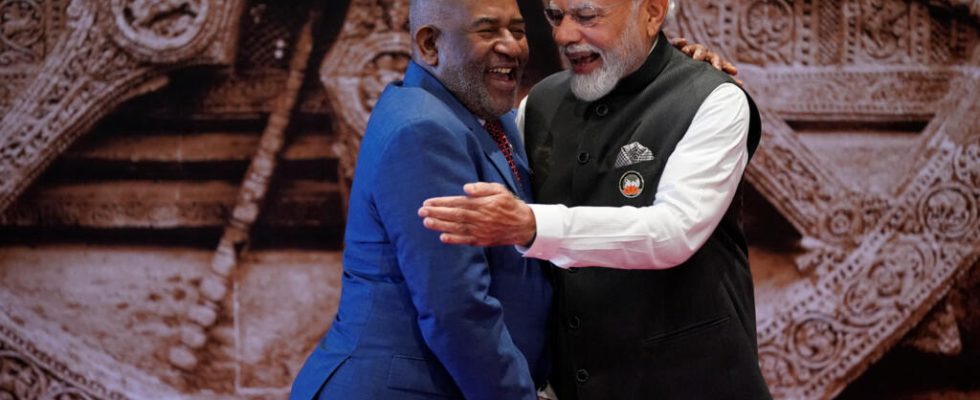The African Union is officially a full member of the G20. This is the first decision taken at the G20 summit, which opened this Saturday morning in New Delhi, under Indian presidency, and in the presence of around a hundred heads of state and international organizations.
2 mins
with our special correspondent, Dominique Baillard, and our correspondent in New Delhi, Sébastien Farcis
The question had been raised for several years, it was noted at the start of this summit by the Indian presidency, unanimously by the members of the G20.
” I invite the Chairperson of the African Union to take his seat as a permanent member of the African Union “. And Narendra Modi to hug tightly the president of the organization and Comorian leader, Azali Assoumani. The President of the Comoros immediately went to sit at the official G20 table to the applause of his peers.
Honored to welcome the African Union as a permanent member of the G20 Family. This will strengthen the G20 and also strengthen the voice of the Global South. pic.twitter.com/fQQvNEA17o
—Narendra Modi (@narendramodi) September 9, 2023
This sequence is already one of the highlights of the Indian Prime Minister’s opening speech, and of the summit.
Read alsoAccession of the African Union supported by the European Union on the menu of the G20 in New Delhi
This entry of Africa into a global governance body is an undeniable success for the Indian presidency. The African Union, a large region of the South, was present at the G20 until then, but only as a guest. Here it is sitting at the same table as the European Union and the 19 richest countries in the world. And this is of course a historic moment for the African continent. Until now, only South Africa, a permanent member of the club, could relay the demands of the fifty countries on the continent.
Concretely, the AU will be able to shape the G20’s commitments on subjects that primarily interest it, such as debt management and access to financing for sustainable development. But it is also a challenge. Because the G20 takes up a multitude of subjects and on many of them, Africans are divided. The AU will therefore have to work a lot upstream to formulate and promote its point of view within this future G20+1.
For the Indian Prime Minister, this anchors his promise to bring the voice of the global South to the G20. The essential questions, wanted by India and the countries of the South, relate, among other things, to the reform of international financial institutions, such as the IMF and the World Bank, as well as the financing of the energy transition. Issues addressed at almost all diplomatic levels now, but which are struggling to find solutions.
Read alsoThe Modi method put to the test of a difficult G20?
